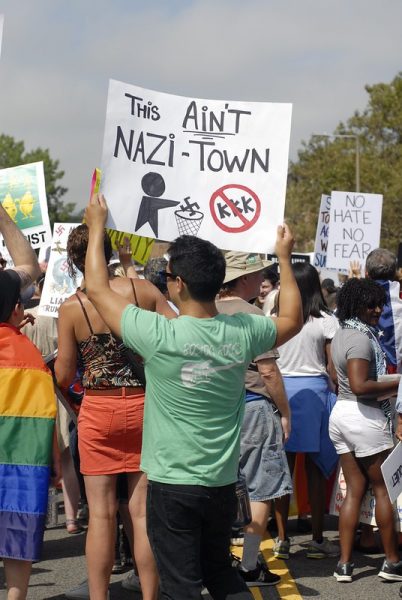
We at The Society Pages have written about the study of “white supremacy” in social science. This term can be used to describe overarching patterns of privilege and power that favor whites or a term that bigotry, prejudice, and belief that whites are a superior race. It may be easy to think that this latter meaning has become less relevant in the contemporary, “post-racial” world, but this is not the case.
In recent years, beliefs about the superiority of whites have actually re-emerged within the political mobilization of populist attitudes, anti-immigrant sentiment, and Right-wing political beliefs in Western democracies. To capture these distinctive and troubling realities, scholars, reporters, and cultural commentators have increasingly begun to use the term “white nationalism.” White nationalism is not just a remnant of outdated, obsolete prejudice; rather, it is has been reconfigured and revitalized for the new global world.
Modern white nationalist rhetoric constructs the image of a historically white country and populace under attack amidst a world of 21st-century immigration, globalization, and shifting racial landscapes. By advancing nativist rhetoric and mobilizing such sentiments in the political arena, white nationalist organizations forwarded understandings of “white” that draw on the idea that the Western world is meant for white people. This has had important political consequences in the USA and Europe; politicians and parties who advance anti-immigration platforms have been bolstered by these dynamics.
- Bart Bonikowski and Paul DiMaggio. 2016. “Varieties of American Popular Nationalism.” American Sociological Review 81(5): 949-980.
- Bart Bonikowski. 2017. “Ethno‐nationalist Populism and the Mobilization of Collective Resentment.” The British Journal of Sociology 68: S181-S213.
- Magne Flemmen and Mike Savage. 2017. “The Politics of Nationalism and White Racism in the UK.” The British Journal of Sociology 68: S233-S264.
Even though relatively few politicians and political parties have openly endorsed white nationalist statements, research shows that white nationalist rhetoric and nativist messages can impact political discourse even among moderate groups. In essence, the presence of white nationalist rhetoric can shape the contours of political discourse more generally. Research has studied such dynamics with an eye to common digital media of the 21st century; the discursive impacts of white nationalist rhetoric are particularly visible in studies of the Internet, social media, and other such platforms. In the 21st century, prominence in the digital sphere is important to how contemporary white nationalist groups make their presence felt.
- Christopher A. Bail. 2014. Terrified: How Anti-Muslim Fringe Organizations Became Mainstream. Princeton University Press.
- Tjitske Akkerman. 2015. “Immigration Policy and Electoral Competition in Western Europe: A Fine-grained Analysis of Party Positions Over the Past Two Decades.” Party Politics 21(1): 54-67.
- Roderick Graham. 2016. “Inter-ideological Mingling: White Extremist Ideology Entering the Mainstream on Twitter.” Sociological Spectrum 36(1): 24-36.
- Amelia Johns. 2017. “Flagging White Nationalism ‘After Cronulla’: From the Beach to the Net.” Journal of Intercultural Studies, 38(3): 349-364.
- Reinhard Heinisch, Steven Saxonberg, Annika Werner, and Fabian Habersack. 2019. “The Effect of Radical Right Fringe Parties on Main Parties in Central and Eastern Europe: Empirical Evidence from Manifesto Data.” Party Politics 1-13
It is important to remember white nationalism and right-wing beliefs are not simply empty rhetoric without material consequence. Authors have described how white nationalist rhetoric and organization can affect electoral results — the “Brexit” vote being one of the most obvious current examples. In addition, upticks in white nationalism and nativist sentiment have been paralleled by increased hostility and violence against minority and immigrant populations, as well as the institutionalization of laws that restrict such groups’ rights by targeting their cultural and religious practices. For example, the push for “burqa bans” in several European countries reflects mobilization by nativist groups that has cast the burqa as a symbolic challenge to national identity. This and example and ones like it highlight the white nationalist belief that the nation should be defined by whiteness and designed for whites.
- Eric Kaufmann. 2019. “Can Narratives of White Identity Reduce Opposition to Immigration and Support for Hard Brexit? A Survey Experiment.” Political Studies 67(1): 31-46
- Thomas J. Scotto, David Sanders, and Jason Reifler. 2018. “The Consequential Nationalist–Globalist Policy Divide in Contemporary Britain: Some Initial Analyses.” Journal of Elections, Public Opinion and Parties 28(1): 38-58.
- David C. Atkinson. 2018. “Charlottesville and the Alt-right: ATturning Point?” Politics, Groups, and Identities 1(2): 309-315.
- Marian Burchardt, Zeynep Yanasmayan, and Matthias Koenig. 2019. “The Judicial Politics of Burqa Bans in Belgium and Spain—Socio-Legal Field Dynamics and the Standardization of Justificatory Repertoires.” Law & Social Inquiry 44(2): 333-358.

Comments